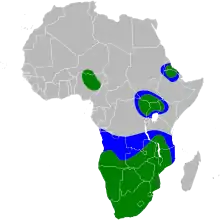White-breasted cormorant
The white-breasted cormorant (Phalacrocorax lucidus) is much like the widespread great cormorant and if not a regional variant of the same species, is at least very closely related. It is distinguished from other forms of the great cormorant by its white breast and by the fact that subpopulations are freshwater birds.[2] Phalacrocorax lucidus is not to be confused with the smaller and very different endemic South Australian black-faced cormorant, which also is sometimes called the white-breasted cormorant.
| White-breasted cormorant | |
|---|---|
.jpg.webp) | |
| Lake Ziway, Ethiopia | |
| Scientific classification | |
| Domain: | Eukaryota |
| Kingdom: | Animalia |
| Phylum: | Chordata |
| Clade: | Dinosauria |
| Class: | Aves |
| Order: | Suliformes |
| Family: | Phalacrocoracidae |
| Genus: | Phalacrocorax |
| Species: | P. lucidus |
| Binomial name | |
| Phalacrocorax lucidus (Lichtenstein, MHC, 1823) | |
 | |
| Range, excluding isolated northern and western populations[1]
breeding range non-breeding range | |
| Synonyms | |
|
Phalacrocorax carbo lucidus | |
Taxonomy and description
The white-breasted cormorant (Phalacrocorax lucidus) is a member of the cormorant family Phalacrocoracidae. Its taxonomic status has been under discussion for some decades[3] and several questions still have not been definitively settled. Phalacrocorax lucidus sometimes is treated as a subspecies of the great cormorant, Phalacrocorax carbo lucidus, but some authorities (e.g. Sibley & Monroe, 1990, Sinclair, Hockey and Tarboton, 2002) retain its original treatment as an allospecies in the P. carbo superspecific group, in which case it is referred to as Phalacrocorax lucidus. A black-necked form originally classified as Phalacrocorax patricki or Phalacrocorax carbo patricki is now regarded as synonymous with Phalacrocorax lucidus.
As its name suggests, the 80–100 centimetres (31–39 in) long white-breasted cormorant has a white neck and breast when adult, and the white area tends to increase as the bird becomes more mature. In other respects it is a large cormorant generally resembling the great cormorant.
The smaller and very different southern Australian black-faced cormorant, Phalacrocorax fuscescens, is also sometimes known as the white-breasted cormorant.
Distribution
.jpg.webp)
The white-breasted cormorant is the only form of great cormorant found in Sub-Saharan Africa, the only form that has strictly freshwater populations and the only form with a white breast and throat; it does however interbreed freely with dark-breasted forms in central Africa.[2] It has a wide distribution; on the west coast from the Cape Verde Islands to Guinea-Bissau and from Angola to the Cape of Good Hope and northwards on the east coast to Mozambique. It occurs around the entire Southern African coastline, but it is not clear whether the coastal populations are separate from the inland populations. On the African mainland it occurs more frequently in eastern and southern parts, rather than in the drier western regions, where it usually is found only on perennial rivers and dams. On inland waters it commonly occurs together with the reed cormorant and the African darter, but it is ecologically separated from these species by its fishing habits and the size and nature of its prey.[2] There are also inland populations in Nigeria and around Lake Chad, and in eastern and southern Africa from Sudan southwards. It can be found around the Red Sea, where it is sometimes referred to as the Red Sea white-breasted cormorant.
Gallery
.jpg.webp) A nesting colony in iSimangaliso Wetland Park, South Africa
A nesting colony in iSimangaliso Wetland Park, South Africa%252C_crop.jpg.webp) Breeding adults, distinguishable by their white flank spots, at Lake Edward, Uganda
Breeding adults, distinguishable by their white flank spots, at Lake Edward, Uganda_with_feather_composite.jpg.webp) playing with feather, Ethiopia
playing with feather, Ethiopia%252C_crop.jpg.webp) In flight, carrying nesting material
In flight, carrying nesting material Off the Senegal coast
Off the Senegal coast
References
- Nelson, J. Bryan (2006). Pelicans, cormorants and their relatives: Pelecanidae, Sulidae, Phalacrocoracidae, Anhingidae, Fregatidae, Phaethontidae (Bird families of the world, Vol. 17 ed.). New York: Oxford University Press. ISBN 9780198577270.
- J.A. Harrison, D.G. Allan, L.G. Underhill, M. Herremans, A.J. Tree, V. Parker, C.J. Brown (eds). The Atlas of Southern African Birds. Published by BirdLife South Africa, P.O. Box 84394, Greenside 2034, Johannesburg, South Africa 1997 ISBN 0 620 20729 9
- Brooke RK, Cooper J, Shelton PA, Crawford RJM. Taxonomy, distribution, population size, breeding & conservation of the Whitebreasted Cormorant, Phalacrocorax carbo, on the Southern African coast. Gerfaut 72, pp 188–220 1982.
- Authors unknown (1974) The status of the cormorants, Phalacrocorax carbo lucidus and Phalacrocorax carbo patricki. Bulletin of the British Ornithologists' Club, 94, 104–107.
- Johnsgaard, P. A. (1993). Cormorants, darters and pelicans of the world. Washington DC: Smithsonian Institution Press.
- Sibley, C. G., & Monroe, B. L. (1990). Distribution and taxonomy of birds of the world. New Haven CT: Yale University Press.
- Ian Sinclair, Phil Hockey and Warwick Tarboton, SASOL Birds of Southern Africa (Struik 2002) ISBN 1-86872-721-1
External links
- White-breasted cormorant - The Atlas of Southern African Birds
- White-breasted cormorant sleeping on transmission lines -- paper in Biodiversity Observations